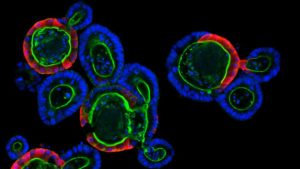Generation and Application of Organoid Disease Models
29 October–3 November 2023
Wellcome Genome Campus, UK
Summary
The advent of the organoid technology has allowed us to initiate the derivation of the next-generation of cell models with the ability to efficiently create preclinical cell models from normal tissue, cancer types and diseases where it was once impossible. Organoid models are complex, requiring specific handling and culture conditions. An understanding of these requirements will ensure the best chance of success when researchers begin using these models and utilising them for downstream processing.
The aim of this course is to provide participants with practical experience to generate and culture different organoid models, including organoids derived from endometrium, intestinal, and cancer tissues. Students will also gain experience in various downstream applications of organoids cultures including; imagining, drug screening, and organoid manipulation. This course uses both seminars and hands-on sessions to provide participants with the knowledge and practical experience begin using these models in their own institutes and research projects.
Target audience: The course is aimed at scientists who wish to derive or utilise organoid disease models as part of their work and/or research projects. Early career researchers, PhD students, postdoctoral scientists and staff from core facilities are eligible to apply. Participants will be expected to have cell culture experience but no experience in organoid model derivation, maintenance, and expansion.
Learning outcomes
After attending this course, participants should be able to:
- Derive organoid disease models from patient specimens
- Expand, maintain, and perform a variety of downstream applications with the models including staining and drug screening
- Interpret the caveats of using organoid models and apply the necessary quality control procedures that should be in place during their use
- Utilise the online resources containing information and metadata on available organoid models for their work
Programme
The course will primarily be hands-on guided by experienced instructors with a breadth of knowledge of the technology as well as the use of the models in downstream experiments and assays. The programme will include practical laboratory sessions, lectures, and discussions covering the following topics:
- Cancer, intestinal and endometrial organoid generation from a human patient sample
- Identifying early signs of model generation success and understanding of model generation failure
- Maintenance, counting and expansion of organoid models
- Cryopreserving and thawing of models
- Staining and imaging of organoid models
- Performing lentiviral transduction of organoid models
- The use of suspension cultures for large expansions
- Drug Screening in Organoid Models
- The use of open catalogues in selecting the appropriate organoid models for your research question
Organisers and speakers
Organisers (Instructors)
Amy Yeung (Wellcome Sanger Institute)
Organiser
Maryna Panamarova (Wellcome Sanger Institute)
Organiser
Guest speakers
Mathew Garnett (Wellcome Sanger Institute)
Speaker
Matthias Zilbauer (University of Cambridge)
Speaker
Laura Pellegrini
Speaker
Roser Vento-Tormo (Wellcome Sanger Institute)
Speaker
How to apply
Prerequisites
Participants will be expected to have cell culture experience but no experience in organoid model derivation, maintenance and expansion.Early career researchers, PhD students, postdoctoral scientists and staff from core facilities who wish to derive or utilise organoid disease models as part of their work and/or research projects are eligible to apply.
How to Apply
Please click the Apply button above to begin the online application process. Places are limited and will be awarded on merit. If you have any problems with the online application process, please contact us.
Please note: Applications must be supported by a recommendation from a scientific or clinical sponsor (e.g. supervisor, line manager or head of department). A request for a supporting statement will be sent to your nominated sponsor automatically during the application process. Applicants must ensure that their sponsor provides this supporting statement by the application deadline. Applications without a supporting statement cannot be considered.
Travel visas
Successful applicants will be provided with a support letter for their visa application, if required.
Please visit the following websites for further information on visiting the UK:
Cost
| Cost | Accommodation / meals | |
| *Course fee | £820 | This is a residential course and the fee includes all on-site accommodation and meals. |
*The course fee is subsidised by Wellcome Connecting Science and applies to non-commercial applicants. Please contact us for the commercial fee.
Bursaries
Limited bursaries are available (up to 50% reduction on the course fee) and are awarded on merit. If you would like to apply for a bursary, please complete the bursary section of the online application form.
Where there are many bursary applications, the selection committee may issue smaller amounts.
Applicants will be notified of a bursary award along with their place on the course, usually within one month of the application deadline. The decision of the selection committee is final.
Please note that both the applicant and sponsor are required to provide a justification for the bursary as part of the application.
Additional funding opportunities
Visit our support page for additional financial support opportunities currently available.
Extra accommodation
If you wish to book onsite accommodation either side of the course dates, please contact the Conference Centre directly.
Accommodation services phishing scam – please be vigilant. More information.
Testimonials
Feedback from the 2022 course:
“The training team was exceptional.”
“…organization and content were impeccable..”
“…atmosphere was encouraging…”
“…so many things in such a short time…”

